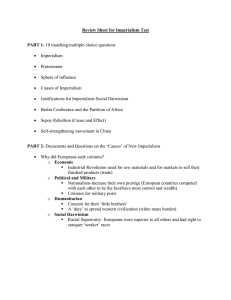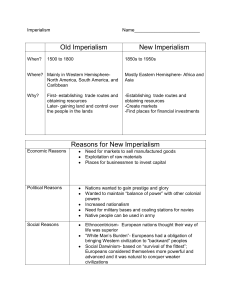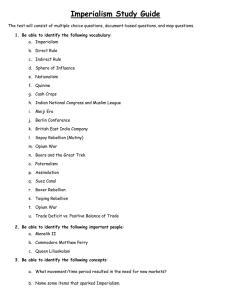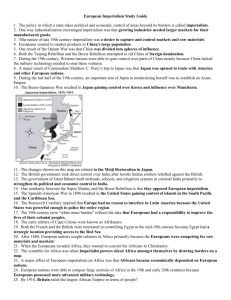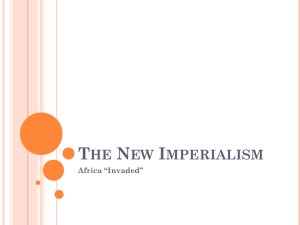Motives Driving the New Imperialism
advertisement
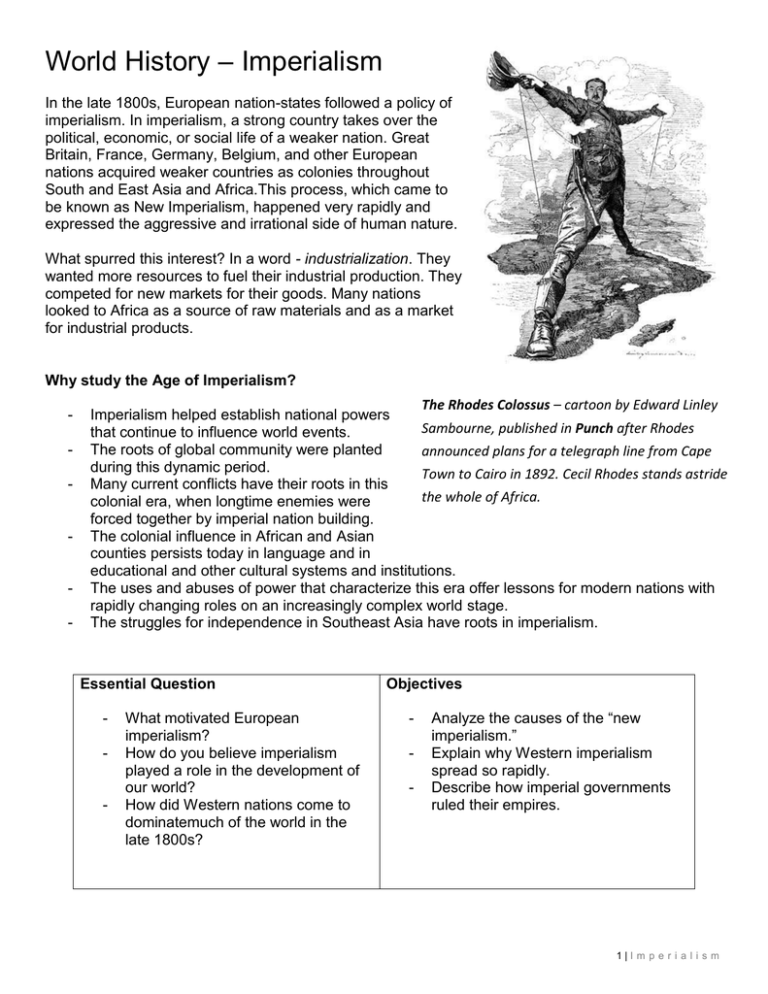
World History – Imperialism In the late 1800s, European nation-states followed a policy of imperialism. In imperialism, a strong country takes over the political, economic, or social life of a weaker nation. Great Britain, France, Germany, Belgium, and other European nations acquired weaker countries as colonies throughout South and East Asia and Africa.This process, which came to be known as New Imperialism, happened very rapidly and expressed the aggressive and irrational side of human nature. What spurred this interest? In a word - industrialization. They wanted more resources to fuel their industrial production. They competed for new markets for their goods. Many nations looked to Africa as a source of raw materials and as a market for industrial products. Why study the Age of Imperialism? - - - The Rhodes Colossus – cartoon by Edward Linley Imperialism helped establish national powers Sambourne, published in Punch after Rhodes that continue to influence world events. The roots of global community were planted announced plans for a telegraph line from Cape during this dynamic period. Town to Cairo in 1892. Cecil Rhodes stands astride Many current conflicts have their roots in this the whole of Africa. colonial era, when longtime enemies were forced together by imperial nation building. The colonial influence in African and Asian counties persists today in language and in educational and other cultural systems and institutions. The uses and abuses of power that characterize this era offer lessons for modern nations with rapidly changing roles on an increasingly complex world stage. The struggles for independence in Southeast Asia have roots in imperialism. Essential Question - - What motivated European imperialism? How do you believe imperialism played a role in the development of our world? How did Western nations come to dominatemuch of the world in the late 1800s? Objectives - Analyze the causes of the “new imperialism.” Explain why Western imperialism spread so rapidly. Describe how imperial governments ruled their empires. 1|I m p e r i a li s m Start Here … Which of the following statements do you agree with? Support your response. 1. 2. 3. 4. A stronger country has the right to take over a weaker country. A strong country should never interfere with weaker countries. A strong country should use its strength to help weaker countries. A strong country should use its strength to gain the most economic advantages possible from weaker countries. Write your response here. Chapter 12, Section 1,Building Overseas Empires, pp. 388-391 Great Britain and other Western countries built overseas empires in the late 1800s. Advances in science and technology, industry, transportation, and communication gave these industrialized nations many advantages. Armed with new economic and political power, Western nations set out to dominate the world. Motives Driving the New Imperialism In the late 1800s, Western imperialism expanded aggressively. • Imperialism is the domination by one country of the political, economic, or cultural life of another country or region. • Although Europeans had established colonies earlier, they had previously had little direct influence over people in China, India, or Africa. The strong, centrally governed nation-states of Europe were greatly enriched by the Industrial Revolution. • Encouraged by their new strength, these nations embarked on a path of expansion—the new imperialism. 2|I m p e r i a li s m The Forces Behind the “New Imperialism” • New sources of raw materials • New markets to sell goods • New ventures and enterprises Political and military needs • Naval refueling bases • Stopping the expansion of rivals • Promoting national security and prestige • Aggressive national pride, known as jingoism, fueled competition for colonies. It means patriotism in the form of aggressiveforeign policy.Jingoism also refers to a country's ad vocation of the use of threats or actual force against peaceful relations, either economic or political, with other countries in order to safeguard what it perceives as its national interests. Economic needs Imperialism was also driven by genuine humanitarian and religious goals. • Missionaries, doctors, and colonial officials saw it as their duty to spread the blessings of Western civilization. • These benefits included medicine, law, and the Christian religion. Behind the West’s civilizing mission was also a senseof racial superiority. • Social Darwinists applied Darwin’s theory of natural selection to societies. • They saw imperialism as nature’s way of improving the human race. • As a result, many non-Westerners lost their cultural heritage. Herbert Spencer --------------------------------------------------------------------------------------------------------------------------------------Directions: Use the information provided to answer the following questions. 1. Describe the four main motives of the new imperialists. 2. Who stood to “profit” or “gain” from each of the factors that led to the new imperialism? 3|I m p e r i a li s m A British poster from 1927 called 'Jungles Today Are Gold Mines Tomorrow' Study this source carefully. 1. What impression does this source give of life in the British Empire in terms of the following issues: The treatment of native peoples in the British Empire? Whether native people were involved in running their own countries? The benefits of economic development in the empire? The economic benefits of the empire to Britain? 4|I m p e r i a li s m 2.Explain whether you think this source gives a positive or negative view of the empire. --------------------------------------------------------------------------------------------------------------------------------------- The Rapid Spread of Western Imperialism From 1870 to 1914, imperialist nations gained control over much of the world. • Explorers, missionaries, soldiers, merchants, and settlers led the way. • Imperialism found support among all classes of society, including bankers, manufacturers, and workers. Western expansion succeeded for a number of reasons. Disadvantages of the non-Western nations Advantages of the Western nations • • • • • • • The Ottoman and Chinese civilizations were in decline. The slave trade had damaged African nations. They had strong economies and well-organized governments. They had superior technology in weapons, communication, medicine, and transportation. Asians and Africans resisted but were over-powered by weapons such as the Maxim machine gun. Some tried to strengthen their societies by reforming their Hindu, Muslim, or Confucian traditions. Educated Africans and Asians tried to form nationalist movements to expel the imperialists. Within Western nations, a small group of anti-imperialists opposed empire building. • Some saw imperialism as a tool of the rich. • Some felt it was immoral. • Others saw it as undemocratic. Westerners were moving toward greater democracy at home, they argued, but were imposing undemocratic rule on others. 5|I m p e r i a li s m Directions: Use the information provided to complete the chart. Think beyond those discussed or listed in the book/reading material. Western Strengths Weaknesses Non-Western Strengths Weaknesses Afterwards – Think about what the chart shows. Answer this question, “Were the western and nonwestern countries evenly matched?” Why or why not? Support your response. When you are finished writing your response, share it with the person sitting next to you. 6|I m p e r i a li s m Comparing Viewpoints – European Conquest of Africa, page 390 Directions: Read the primary source excerpts and answer the following questions. 1. What is Cecil Rhodes argument for imperialism? 2. What is Chief Kabono’s argument against it? ------------------------------------------------------------------------------------------------------------------------------------ Forms of Imperial Rule Imperialist nations developed several ways to rule their colonies. • • • • France generally ruled directly. Britain generally ruled indirectly. • French administrators were sent. The goal was to impose French culture. Local rulers were left in charge. The children of the ruling class were educated in England. The goal was to groom or “Westernize” future leaders. Two other forms of rule were through protectorates and spheres of influence. Protectorates Spheres of Influence • • • • • Local leaders were kept in office. Colonial advisors told them what to do. This method was less costly. Colonial powers claimed exclusive right to trade or invest in a particular area. The goal was to prevent conflict with other colonial powers. Directions: Answer the following question. 1. Which form of managing imperial interests do you think would be most effective and why? Support your response. Afterwards –When you are finished writing your response, share it with the person sitting next to you. 7|I m p e r i a li s m Chapter 12, Section 2 - The Partition of Africa, pp. 392-398 In the late 1800s, Britain, France, Germany, and other European powers began scramble for African territories. Within about 20 years, the Europeans had carved up the continent and dominated millions of Africans. Essential Question Objectives How did imperialist European powers claim control over most of Africa by the end of the 1800s? 1. Describe the forces that shaped Africa. 2. Explain why European contact with Africa increased during the 1800s. 3. Understand how Leopold II started a scramble for colonies. 4. Describe how Africans resisted imperialism. Africa in the Early 1800s, pages 392-393 What does Africa look like before the Europeans came? As you are reading the textbook and the chart think about Objective 1 – Describe the forces that shaped Africa. African regions varied in history and religion. North Africa West Africa East Africa • Since before 1800, this region was part of the Muslim world. In the early 1800s, the Ottoman Empire controlled this area. • Site of an Islamic revival in the early 1800s led by Usman danFodio, who called for Sharia law (Islamic law) and exclusion of Europeans • In the forests, the Asante gained control. • More than a dozen Islamic leaders rose to power, replacing older rulers or founding new states in the western Sudan. Some leaders and states chose to trade with Europeans. • Muslims had long carried out a profitable trade in cities such as Mombasa. • Slaves, ivory, and copper were exchanged for Indian cloth and firearms. Read the section on Southern Africa on page 393. Explain how the Zulus tried to protect their kingdom. 8|I m p e r i a li s m Answer … 1. What effects did Islam have in Africa? 2. What were two main forces of change before imperialism spread? The slave trade was in decline but continued to have an impact on Africa. • In the early 1800s, European nations began to outlaw the Atlantic slave trade. • Sierra Leone and Liberia were formed as settlements for former slaves. • By 1847, Liberia was an independent republic and retained its independence despite the growth of imperialism. • The East African slave trade to Asia continued. 9|I m p e r i a li s m European Contact Increases, page 394 From the 1500s through the 1700s Europeans traded along the African coast. Africans wanted to trade with Europeans but did not want to “house them.” Resistance by Africans, difficult geography, and diseases all kept Europeans from moving into the interior regions of the continent. Medical advances and river steamships changed all that in the 1800s. Directions: Read about the explorers, missionaries and Dr. Livingston on page 394.As you are reading think about Objective 2 - Explain why European contact with Africa increased during the 1800s. 1. Why were explorers and missionaries held in high regard by Europeans? 2. What impact did explorers and missionaries have on Africa? 3. How might Africans have felt about them? 4. The best known of the missionaries was Dr. David Livingstone. For thirty years he crisscrossed East Africa. Livingstone believed trade and Christianity were the ways to end the slave trade. He blazed a trail that others followed. In 1871, the American journalist Henry Stanley trekked across Africa to “find” Livingstone. Stanley found Livingstone in present-day Tanzania, greeting him with the now-famous words “Dr. Livingstone, I presume.” Activity Directions: Within your group organize a debate on whether or not imperialism was advantageous for Africans. Try to have an even number of on each side. One side will debate yes/pro; the other will debate no/con. Yes/Pro will deliver their comments first, then No/con. Remember to listen to what is being said because you will answer the reflection question at the end. Give each side three minutes to prepare for the debate. Points to consider: - Europeans brought medicine and education to Africa and ended slavery. Europeans violated Africans’ right to self-determination, destroyed traditional societies and exploited the people and their land and resources without fair compensation. Reflection: What did you learn from the other side’s presentation? Each side must turn in their debate notes. 10 | I m p e r i a l i s m A Scramble for Colonies, pages 394-396 Directions: Watch the DVD “The Scramble for Africa” and write down 5 facts. 1. 2. 3. 4. 5. Here’s Objective 3 - Understand how Leopold II started a scramble for colonies. Read pages 394-396 and answer the questions. 1. How did Leopold II gain colonies in the Congo River basin? 2. What was the Berlin Conference? Why do you think the Europeans did not invite the Africans? 3. Why did the Belgium government take away King Leopold II’s colonies? 4. What areas did France grab? 5. What areas did Great Britain control? Other European nations sought colonies as well. Additional European powers who sought colonies included: • Germany • Italy • Portugal 11 | I m p e r i a l i s m Africans Resist Imperialism, pages 297-298 Finally,Objective 4 - Describe how Africans resisted imperialism. Directions – Read pages 297-298 and answer the questions that follow. • The French faced resistance from the Algerians and from SamoriTouré in West Africa. • The British battled Zulu leader Shaka and Asante queen YaaAsantewaa. • Another woman warrior who resisted imperialism was Nehandaof the Shona people. These efforts at resistance failed. However, in the 1900s, a newelite of Western-educated Africans would forge nationalist movements to pursue independence. Answer … Describe how Africans resisted European imperialism. 1. Read Ethiopia Survives and Biography – Menelik II. Page 397 1. How did Menelik II preserve Ethiopian independence? 12 | I m p e r i a l i s m Chapter 19, Section 3 African Nations Gain Independence, pp. 662-668 Background … The great liberation of African from European colonialism dramatically transformed the global political picture. A total of ninety new countries emerged (worldwide) between the mid-1940s and the 1990s. Well over a billion people – a third of the earth’s population – gained their independence of foreign rule. The liberation struggles were a complex, confusing business, but some general patterns can be detected. The leaders of the various movements for colonial emancipation tended to be both Westernized and charismatic. As Western-educated people, they could deal effectively with their European rulers. They knew the game. Those who did not know how to play the game because they were not educated in Western schools were at a considerable disadvantage. The strength of many colonial revolts also resided in powerful independence parties put together by the new colonial leadership. These intensely nationalistic organizations were strongly centralized on the person of the leader. They helped to overcome regional, religious, tribal, or other differences within the colony, to articulate common demands, and to mobilize mass support for challenges to colonial authority. After independence was achieved, however, these parties tended to become a stronger focus for loyalty than the new nation itself. In some places, they became the core of one-party governments. In some of the emerging nations, bitter and sometimes long-drawn-out revolutions were fought before independence was achieved. In general, however, a relatively low level of violence – by comparison, say, with the long revolutions of the first half of the century – accompanied the great liberation. 13 | I m p e r i a l i s m Achieving Independence In the decades after World War II, Europe’s colonies in Africa became independent nations. Some achieved independence peacefully. In other countries, the fight was more violent. In country after country, bands played new national anthems, and crowds cheered the good news. However, as Africans celebrated their freedom, they also faced many challenges. Before Essential Questions - How does a newly independent country build a new country? What challenges did new African nations face? After Objectives - Describe how Africa’s colonies gained independence. Explain how Africans built new nations. Analyze the recent histories of five African nations. Growing Unrest • Negritude movement - pre-World War II celebration of African culture • War effort emboldens Africans; Europeans question colonial policy too • Colonies take different paths to freedom; some peaceful, some violent • Many African colonies become new nations in years after World War II • Most new African nations struggle to become stable and strong 14 | I m p e r i a l i s m New Nations Emerge in Africa • • Africa has great geographic diversity including deserts, savannas (grasslands), and tropical rain forests. Africa has many resources, which under imperialism had benefited the colonial powers. – Fertile farmland – Mineral wealth – Cash crops Ghana Leads the Way • British colony, Gold Coast, is first to gain independence in 1957 • Kwame Nkrumah - a socialist leader ousts Britain from Gold Coast •Nkrumah serves as first president, attempts to modernize countryby nationalizing businesses and building a huge power dam. •His policies hurt economybecause they led to massive debt; he is eventually ousted from power • Army begins long rule in 1966 • After a coup in 1981, the economy grew stronger and power was restored to the people of Ghana. • Military officer Jerry Rawlings took control. • The economy, based on exports of gold and cacao, improved. • Rawlings peacefully handed over power after losing an election in 2002. Kenya Claims Independence •A group of Kikuyu militants, called Mau Mau by the British, began attacking white settlers in the 1950s. •The British jailed Kikuyu spokesman Jomo Kenyatta, who had long called for nonviolent resistance. •Violence continued on both sides. •Kenya wins independence in 1963; Kenyatta becomes president • Daniel arapMoi follows Kenyatta, ruling harshly, corruptly • Moi resigns in 2002; new party gains power through free elections 15 | I m p e r i a l i s m Algeria Struggles with Independence Algeria wins independence from France in 1962 after a violent armed struggle. •Over a million French citizens lived in Algeria. France did not wish to leave or to give up oil and natural gas wells. •From 1945 to 1962, Algerian guerrillas waged war against the French. Algeria became independent in 1962. •The military took over Algeria and fought Islamist rebels. The conflict slowed in 1999, but the tensions still remain. Civil War in Congo Economic rivalries plagued the Democratic Republic of the Congo, formerly the Belgian Congo. •Congo wins independence from Belgium in 1960 • Civil war soon broke out when the copper-rich Katanga province tried to break away. • Belgian mining companies supported Katanga, and Cold War superpowers backed rival leaders. • In 1965, Mobuto SeseSeko took over in a military coup. • His corrupt 30-year rule bankrupted the Congo. • Mobutu was finally driven from power in 1997, but civil war continued. • In 2006, Joseph Kabila became president in the nation’s first free elections in 41 years. Nigeria Nigeria, the most populous nation in Africa, gained independence in 1960. • Discovery of oil in 1963 gave hope for a better future, but prosperity has been elusive. • The nation has faced military coups and ethnic rivalries. • In 1966, Ibos in the South set up the republic of Biafra. • The rebellion failed and half a million Biafrans died of violence or starvation. • Conflict continued despite free elections in 1999. 16 | I m p e r i a l i s m South Africa Struggles for Freedom, Chapter 20, Section 2, pages 686-688 Background … The struggle for freedom in South Africa was different than elsewhere. • South Africa gained its independence in 1910 as a white-ruled nation. • Whites made up less than 20 percent of the population but controlled the government and the economy. • In 1948, the existing racial segregation was expanded into the system of apartheid. • The white majority government passed racial laws that severely restricted the black majority. Essential Question Objective 17 | I m p e r i a l i s m ANC = African National Congress - established in _____________ - Sought _______________________ rights for blacks in South Africa - In 1931 the ANC began to organize _______________________ protests & _________________________ - It’s leader? _________________________________________ South African government began to further _________________________ freedoms of 1948 blacks Government launched system of _________________________________ - Definition? System of separating South Africa into racial group under ____________________________ - Four groups of South Africa? - Schools, hospitals, playgrounds & beaches were all _____________________ Definition? - Set apart according to race New laws for blacks Who they could ______________________ ____________________ they could live Where to go to _______________________ What _______________________ they do Blacks couldn’t own ________________ or _______________ an apartment in _________________ territory - white territory = ____% of South Africa (including rich diamond & gold mines) The __________________________ Policy – 1959 S.A. Parliament created separate ______________________, or homelands for blacks Each _____________________________ was to have its own homeland Eventually they would become ______________________________________ Homelands were the ________________________________ lands in South Africa Description? Cheap _______________ & _________________ (no heat, electricity, running water Blacks = _____ of population but only _____ % of the land! Was theirs Blacks couldn’t leave homeland without a ___________________ 18 | I m p e r i a l i s m - Don’t have a pass? - Only blacks with _________________ could get passes - RESULT? Families were ___________________ Why not speak up? We have no choice in the matter. Criticize the government … and go to ________________ or house arrest (banning) Books & ___________________________ were censored Police were strong (________________________ was common) Whites were given ___________________ & were trained to use them _________________________________________ - 1960 Hundreds of _________________________ marchers met to protest _____________________________ RESULT? Police open fire: kill 69 & injure 186 It’s called the… It isolated South Africa The government banned the ANC and many were jailed - ANC went “__________________________________” - Formed a more ___________________________ wing - Umkhonto we Sizwe – AKA “____________________________ of the Nation” - What did it do? Turned to ____________________ (blew up RR & public buildings) - Mandela charged with ______________________ & sentenced to jail for life SASO - 1969 Stands for…South African Student Organization Started by black university students Led by ______________________________________ - “___________________________ in South Africa must be ______________________, or changed” - “Let’s protest” ___________________________________ - 1976 Police fire on students protest the mandatory use of ___________________ language in school ______ students killed 19 | I m p e r i a l i s m Biko was eventually __________________________ & killed in ________________ 1980’s = Protests & Riots Reaction by S.A. gov’t = ____________________________ September 1984 – April 1985 ____ Africans killed, ____ Africans injured, ___________ arrested South Africa became an international __________________________ 1970 – ________ from Olympics 1977 – United Nations ______ South Africa out 1986 - ____________ imposed sanctions on South Africa discouraged _______________________ from doing business there 1989 - ____________________________________ is elected president of South Africa “I’m determined to transform South Africa” 1990 – _________________ was unbanned and _________________ freed (ANC leader) 1991 – Parliament repeals segregation laws & President ___________ announces that sanctions will be lifted 1991 – International Olympic Committee lifts its 21 year old ______________ on South African athletes Mandela reminds everyone that legal barriers were gone but not ____________________ ones “We can’t afford _____________________________” “Whites still have all the _______________” “We still can’t ____________________________” 1994 – DeKlerk held 1st universal elections 20 | I m p e r i a l i s m

